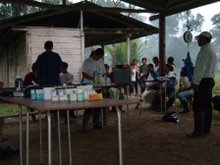Malek.
On Monday, we went to SCOM to buy the rest of the block for the dividing walls. SCOM's office is very near Malek; the company is using land formerly owned by an oil company that moved out when war broke out in 2008. SCOM is run by a group of unfriendly Maldovians producing block at $2 each and making a hefty profit.
After we got our block loaded onto a hired truck, we transported it to the clinic site and unloaded it as a community. This week, Anyuen and Alier will move to the clinic site as their living quarters are also in the process of being built.
Later in the day, Deng told us that the women in the community had some concerns they wanted to share with us. We had specifically wanted to meet with them, too, so we were excited about the opportunity. It has been difficult to meet with the community as a whole because they are at work planting maize and sorghum in preparation the rainy season. They were concerned about not having a woman employee at the clinic to confide in. There was also a traditional birth attendant at the meeting who was eager to learn more skills as she has no formal training. Their worries were real and helped us understand their needs. We are working on addressing them through a community elected female liaison and considering formal midwife training through a nurse contact we met in Bor. We assured them that primary health care can only be achieved with healthy women and children, so their active participation is crucial.
Talking about health opened other doors. One elder woman told us they are powerless in their culture--they have no say in important decisions and are beaten if they disobey the men in their families. Girls are married early in life because their marriage brings their family a dowry of 100 or so cows. Their fathers are eager to trade them for the cattle, attempting to regain what they lost in marriage (their family had to pay cows to marry the women who became their wives). If the women refuse, they can be killed by their own brother, father or uncle. A 17 year old girl was beaten to death by her father last month for deciding to marry a man with no cows. A similar story was later relayed.
The women said they confided in us because we came as two women with so much independence. It gave them hope. I asked them if they thought educating their daughters was important. They all agreed, but said school is too expensive and fathers want their daughters to marry as early as possible--after primary school if there's a suitor!
The burden of these cultural barriers is catastrophic. The only thing I can think of to lift these women up is an education for their girls. They agree. The majority of their daughters will not go to high school. They will be married/traded for cows,have a baby every year, and raise poor children who are also uneducated.
It also occurred to me that microfinance might empower the women of Malek. I asked them if any of them make anything to sell. Only one of them answered yes. But the market is so far away, several hours by foot. They have nothing to sell and no one to sell it to. I learned about microfinance in my MPH training but the sense of powerlessness of these Sudanese women made me understand their desperate need for financial independence in a much more immediate way. Microlending won't solve all the problems these women face, but maybe it will empower them, and cultural changes take time.
Today, we met with another physician at Bor Hospital, Dr Samuel, who answered a lot of our questions regarding some of the challenges of working in South Sudan and particularly in a rural area. It felt strange asking him questions like "what do you do for diarrhea?" and "what prenatal/perinatal care can be offered in a rural health care setting?" but the practice of medicine is so different here.
Next, we held a clinic for the community. It was clear that many problems were related to basic hygiene. The most heartbreaking cases were the babies with diarrhea. We did some counseling on basic hygiene, but the lack of sewage and running water make it so tough. We saw another patient with complications resulting from a combination of poor dental hygiene and dehydration (ill spare you the details). Public health interventions are definitely going to be crucial to the clinic's success.
On the way home, we shared a matatu with one of Deng's cousins Aton who works with a microfinance company in Bor. It turns out they are already lending to groups of women in Malek. Surprisingly, the default rate is high, and when the clients don't pay, the company may take the money from Aton's salary. Then she is left to fight for her money with the women.
Today was our last day as a team in Malek. It was far too short and I can't wait to be back again, God willing. Tomorrow Mom, Mayen and I will go back to Juba and meet with the Ministry of Health for registration and licensing of the clinic under our nonprofit. Then it's back to Nairobi for me and Mom, and back to Bor for Mayen.
Subscribe to:
Post Comments (Atom)





No comments:
Post a Comment